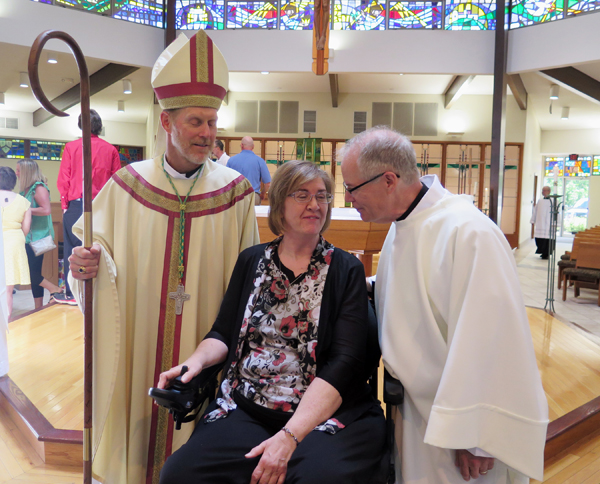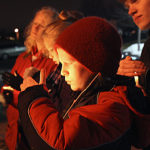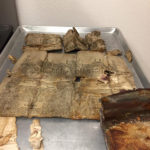
Patty Snyder congratulates her husband Deacon Mike Snyder after his ordination to the diaconate on July 8, 2017. Bishop Thomas Zinkula looks on.
The Hopeful Household: a series about “the real issues that families are facing and where to find hope in the messiness of life.”
By Barb Arland-Fye
The Catholic Messenger
Gradually, Deacon Mike Snyder became the hands and feet and then the voice for his wife, Patty, as they journeyed through her battle with amyotrophic lateral sclerosis (ALS). Losing her voice was the hardest part of the progressive disease for Patty, her husband said during an interview at their home Dec. 28. Patty, seated in a wheelchair in front of their fireplace, nodded in agreement. She died three days later at home, surrounded by her family.
Symptoms of Patty’s illness began about three years ago, during Mike’s studies for the diaconate. After months of trips to doctors and specialists, Patty received an initial diagnosis of multiple sclerosis (MS). But the disease progressed so rapidly that her MS doctor referred the couple to a nerve specialist who performed further testing and diagnosed ALS. They received a second opinion at Mayo Clinic in Rochester, Minn., confirming the diagnosis.
ALS first affected Patty’s hands, feet and legs. “She was able to get around, but couldn’t do the cooking and cleaning. Those were the first things I started taking over,” Mike said during the Dec. 28 interview. Patty listened attentively, propped up in her elevated, tilt-back wheelchair. A soft, colorful blanket featuring butterflies with a blue, crocheted border covered her from chest to feet. She smiled warmly, even though she couldn’t move below her neck. Her positive attitude comes from her trust in God, she said during an earlier interview, interpreted by her husband.
Mike had become Patty’s primary caregiver, one of 65 million Americans caring for a loved one. This labor of love requires the support of family, friends and faith community for the well-being of the caregiver and the recipient of that care, say the Catholic founders of Nourish for Caregivers. The faith-based program addresses the practical, emotional and spiritual needs of families caring for a loved one.
Nourish co-founders Deb Kelsey-Davis, RN, and Kelly Johnson presented a workshop Dec. 1 at the Diocese of Davenport’s headquarters in Davenport. Mike, one of the participants, asked the presenters:
“Do you have a topic on why does God allow these things to happen?” Yes, they responded. Topics have been built on the needs of the people who participate in the program (nourishforcaregivers.com)
“Family caregivers provide 80 percent of all health care today,” Deb said. “That is why we feel especially called to care for the caregivers.”
A day in the life
College sweethearts at Kansas State University, Mike and Patty married Oct. 18, 1980, in the Catholic Church. Mike, a mechanical engineer, took a position with Deere & Company in Des Moines. Patty, who loved young children, was a teacher. Later, Mike accepted a transfer to the Quad Cities, where the couple moved with their two daughters, Allison and Brynn.
They were actively involved in their parishes, first at St. John Vianney and then at Our Lady of Lourdes, both in Bettendorf. Patty taught at Lourdes Catholic School and started the pre-school at St. John Vianney. Both cherished their Catholic faith. Mike had Patty’s support as he discerned and then pursued his calling to the diaconate for the Diocese of Davenport. Mike retired two years ago, coincidentally around the time Patty received her initial diagnosis of MS. They found themselves living a rapidly changing “new normal.”
As a deacon, whose primary ministry is service to others, Patty’s illness “helped me to better understand what a deacon is,” Mike said. “I also learned what marriage vows really mean, and what love is all about.”
He described their daily routine. “The first three hours are taken up by cleaning, bathing, dressing, washing hair and brushing teeth; all of the stuff everybody else does in the morning. It just takes longer,” Mike said. Breakfast usually took them into the late morning because Patty needed to be fed. Their older daughter, Allison, 36, arrived around noon with her son, Logan, 5, to help out for 2-1/2 hours before having to leave to pick up her older son, Jackson, 8, from school.
Mike usually returned from errands before his daughter and grandson left. Chores followed; trips to the bathroom, too, which could take a while, Mike said. Three afternoons a week Mike went to exercise classes; friends selected by Patty took turns staying with her, scheduling their shifts on an electronic calendar. As Patty’s diaphragm and breathing weakened, it was important to have someone in the house 24/7, Mike said.
A hospice nurse arrived twice weekly to take Patty’s vital signs, order supplies, reorder meds, and help the couple work through any challenges they might be having. “A lot of people think hospice is something that you do at the end of life, but the origin of hospice was coming in to help,” Mike said. “I really recommend it when (the life-threatening illness) is early on.”
After his exercise class, Mike would go to Our Lady of Lourdes to get the Eucharist to take home to Patty. They took Communion together and then Mike cooked or heated up dinner. Afterwards, they watched a short movie before preparing for bed. The bedtime routine was physical work, so Mike wasn’t ready to go to sleep. He’d check up on email or pray Evening Prayer if he hadn’t done that yet.
The couple worked out the caregiving/care receiving aspect of their marriage through “trial and error, more than anything,” Mike said. Patty’s needs increased gradually, which made it a little easier for Mike to accept as a caregiver and Patty to accept as a care receiver. “It gave Patty and me the opportunity to adjust little by little,” Mike said.
Mike paused for a moment during the interview; Patty had something to say. She opened her mouth to annunciate words that couldn’t be heard. Mike rose from the sofa, stood next to Patty and placed his hand on her arm. He looked into her eyes and at her lips, hoping to interpret. It was exhausting work for both of them, but the glow in their eyes conveyed a deep, abiding love.
It takes a village to care
Accepting help from others was a challenge, Mike admitted. But he was putting in 16-hour days as a caregiver. He and Patty realized that couldn’t continue. Many people came to their assistance – family, friends and their faith community. Deacon John Weber’s wife Dotty prepared meals for the couple. A St. John Vianney parishioner picked up the couple’s dirty laundry on Monday and returned it clean on Tuesdays, Mike said. Patty’s 86-year-old mom came from Kansas to help out as much as possible. “She came for Christmas and stayed until Easter. We wore her out, pretty much,” Mike said. She returned in May and periodically after that. She cooked, cleaned and helped Patty eat, and could read her daughter’s lips.
A prayer group met monthly at Mike and Patty’s house, initially to pray for healing for Patty. But Mike said she told the group “We need to pray for some other people,” and so they did. Deacon Weber said the prayer group will continue.
“God being first in their life made all the difference,” Sharon Robinson said of Mike and Patty. Sharon and Patty had known each other for years, initially through their involvement at St. John Vianney Parish. But the two became close friends after Sharon, a former occupational therapist, offered to share her knowledge to make life a little easier for the couple.
“In the beginning, we looked at environmental adaptations for independence, how to modify her shower and things like that,” Sharon said. She helped Patty with range of motion exercises to prevent joint contractures. But mostly, they talked and shared their faith. “Patty liked to talk,” Sharon said. “Often she’d share positive things about her faith; sometimes she’d cry and just let it out.” One day, when communication became very difficult, Patty managed to eke out these words: “I have had a big change in my faith. I have so much to tell you. I wish I could talk,” Sharon recalled.
“What struck me the most was her compelling faith and how her love turned from human love into true agape. It just became so unconditional. She couldn’t do anything for herself….I think she came to a level of complete trust; complete, unconditional love. I watched that. It was truly inspiring. She was anointed…. I felt like I was taking care of Jesus.”
There’s “a divine grace in caregiving; you can see it as a ministry,” observed Marianne Agnoli, coordinator of Marriage and Family Life for the Diocese of Davenport.
Advice for other caregivers
From his experience, Mike says, “my advice for caregivers is to get help and not try to do it all by yourself. My advice for a care receiver is to not expect one person to provide all the care you need. Choose which of your desires are most important and let go of many of the rest. One set of hands and feet cannot adequately care for all the needs of two bodies.
“The tricky thing is that Patty and I disagreed on this point. Patty was a private person and always had been; she insisted that I provide all her personal care myself and would not let anyone else help (help with hair, face, teeth, bathing and cleaning, dressing, toileting, etc.). She eventually accepted help from a hospice aide for some things because I forced it to happen when I got overloaded.”
A caregiver stress test provoked some soul searching. “I discovered that I was overloaded physically, mentally, emotionally and spiritually. I was trying to take care of Patty in all these areas and was ignoring myself in many ways. I was in a dark place and didn’t even know it; I was a wreck. I was able to meet the demands of caregiving this way, but it was not sustainable. It was during Easter season that I realized what was happening. I remembered serving at Easter Sunday morning Mass a couple weeks before, which should be the most joyful time for a Catholic.
“I remembered thinking about joy during Mass, and realizing that I was not filled with joy. I could feel the lines etched in my forehead. I tried to smile, but could not. A couple weeks later while talking with Bishop Thomas Zinkula, he asked me if Patty and I had found peace in our situation. That made me reflect and I realized that I was miles from peace….
“I got serious about finding ways to reduce the physical load on my body; allowing others to do more things (for us) was one way to do that. I started sharing more in the ALS Caregiver Support Group that I attended monthly. I let a couple friends get me out of the house more frequently to socialize and relax. I started looking for a spiritual director, which I had been without for several months.
“But the most impactful change I made was counter-intuitive to reducing stress…. I started letting go of many things that I wanted for myself: going places, doing things, having free time for myself. I spent less time thinking about and planning for the future. This was very hard for me to do; my career taught and rewarded me for planning ahead and making it happen.
“As a result, I started to live day by day, not worrying about the future and what it held, and not trying to control my future so much. By giving up, or fasting from these things that I was used to doing, it was much easier to do the things that I needed to, and wanted to do for Patty. I’m certainly not perfect at this, but I think I am much better able to trust God to take the lead. This is an example of the many ways that God was present and working in our situation,” Mike said.












Barb, this is a beautiful story and reminded me the great need to organize some support or provide more resources to the growing number of folks who are providing care for loved ones in their homes. Thank you for addressing this growing concern.
Jennifer, thank you so much for the affirmation. We will continue to address this growing concern regarding caregivers and their need for TLC!
Such a beautiful living example of Christ’s love flowing between these two amazing people. We were blessed to meet Deacon Mike and hear his story. In his struggles he found many blessings. We all can learn much from this inspiring story. Our thoughts and prayers remain with Deacon Mike and his family.